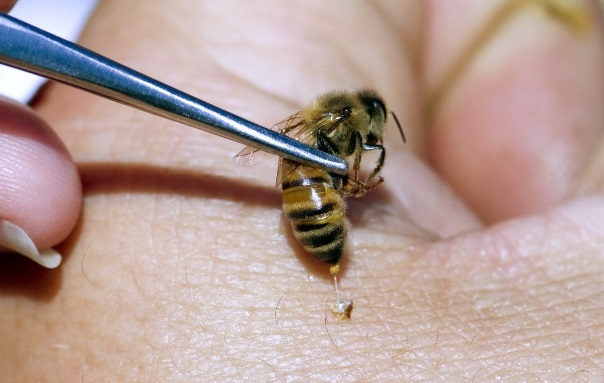Nikhil Prasad Fact checked by:Thailand Medical News Team Jan 19, 2025 11 months, 1 day, 16 hours, 32 minutes ago
Thailand Anti-Aging News: Unlocking the Secrets of Skin Aging
Aging is a natural part of life, but for many, the signs of aging skin - such as wrinkles, dryness, and loss of elasticity - can be a significant concern. Factors like sun exposure, pollution, and natural aging processes contribute to these changes, leaving many searching for solutions to maintain youthful, healthy skin. A groundbreaking study conducted by researchers from Shanxi Agricultural University in China reveals that bee venom and its main component, melittin, may hold the key to delaying skin aging. This
Thailand Anti-Aging News report highlights how bee venom (BV) and melittin (MLT) could revolutionize skincare treatments and provide safer, more effective anti-aging solutions. By exploring their effects on a mouse model of skin aging induced by D-galactose, the researchers sought to uncover the mechanisms through which BV and MLT work to combat signs of aging.
 Bee Venom Shows Potential in Delaying Skin Aging
Study Design: Delving into Bee Venom’s Power
Bee Venom Shows Potential in Delaying Skin Aging
Study Design: Delving into Bee Venom’s Power
Researchers from the College of Life Science and College of Animal Science at Shanxi Agricultural University used D-galactose injections to mimic aging in mice. These mice were then treated with varying doses of bee venom and melittin to assess their potential anti-aging properties. The study included a control group, an aging model group, and groups treated with vitamin C (as a positive control), low and high doses of bee venom, and low and high doses of melittin. Skin samples from these groups were examined to evaluate changes in skin structure, collagen content, and levels of anti-aging and inflammatory factors. The researchers also performed metabolomic analyses to investigate the biochemical pathways affected by the treatments.
Key Findings: Strengthening and Rejuvenating Skin
The study revealed several significant outcomes. Improved skin structure was noted as treatment with bee venom and melittin enhanced the thickness of the epidermis and dermis in aged mice. The junction between these layers became more structured, and subcutaneous fat cells decreased, indicating healthier skin.
Collagen fibers, which are essential for skin elasticity and firmness, were more abundant and tightly arranged in the treated groups compared to the aging group. High doses of bee venom showed particularly notable improvements. Both bee venom and melittin increased the levels of hyaluronic acid and hydroxyproline, which are critical compounds that help retain moisture and strengthen the skin matrix. Inflammatory markers like IL-1β, which accelerate aging, were significantly lowered, while anti-inflammatory markers like IL-10 were elevated in treated groups, indicating reduced skin inflammation.
Metabolomic Insights: Exploring Biochemical Pathways
The study also shed light on how bee venom and melittin influence metabolic pathways. Bee venom was found to regulate the pentose phosphate pathway and pathways related to carbohydrate metabolism, helping restore balance to glucose and amino acid metabolism. Melit
tin primarily influenced lipid metabolism and pathways linked to cholesterol and atherosclerosis, suggesting it promotes healthier skin by improving lipid balance. These results suggest that while both compounds show promise, bee venom has a broader impact due to its complex composition, making it particularly effective in combating skin aging.
Conclusions: A New Frontier in Anti-Aging Research
The findings of this study highlight the potential of bee venom and melittin as powerful tools in the fight against skin aging. Their ability to improve skin structure, increase collagen content, and regulate key metabolic pathways offers promising applications in cosmetics and skincare. Additionally, the study emphasizes the importance of dose optimization for maximizing their anti-aging effects. While further research is needed to fully understand the mechanisms at play, this study provides a strong foundation for the development of bee venom and melittin-based skincare products. The results open the door to safer, more effective anti-aging treatments that harness the natural properties of these compounds.
The study findings were published in the peer-reviewed International Journal of Molecular Sciences.
https://www.mdpi.com/1422-0067/26/2/742
For the latest
Thailand Anti-Aging News, keep on logging to Thailand
Medical News.
Read Also:
https://www.thailandmedical.news/news/american-study-finds-that-the-herb-centella-asiatica-promotes-healthy-aging-by-inducing-distinct-dna-methylation-changes
https://www.thailandmedical.news/news/french-study-uncovers-skin-antiaging-effects-of-milk-thistle-extract
https://www.thailandmedical.news/news/korean-murine-study-shows-that-thymus-quinquecostatus-celakovski-can-possibly-enhance-testosterone-levels-in-aging-men
https://www.thailandmedical.news/news/anti-aging-drug-,alt-711-(alagebrium-chloride)-again-gaining-prominence-due-to-new-studies
